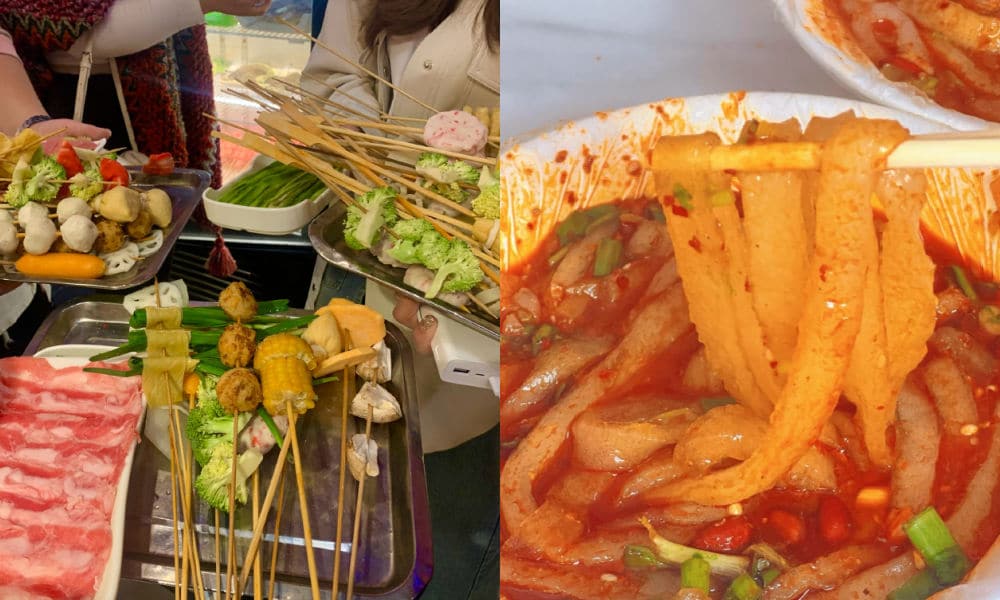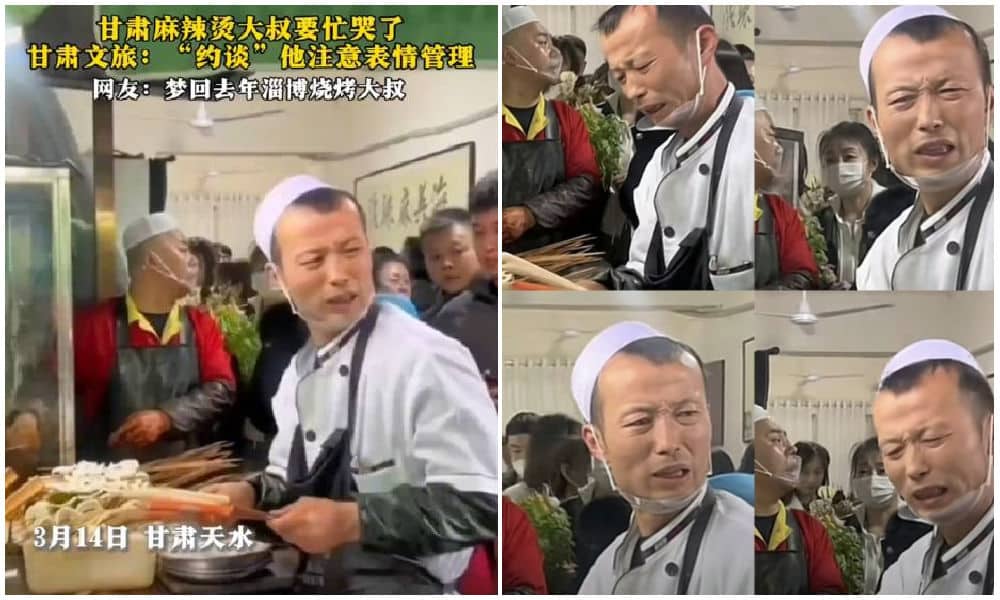China Media
Zhang versus Zhang: An Online Debate over the Value of Studying Journalism in China
Is pursuing a degree in journalism worth it in China? Educational adviser Zhang Xuefeng says no, while professor Zhang Xiaoqiang says yes. Their online debate has captivated millions of people.
Published
10 months agoon
By
Zilan Qian
Chinese educational internet influencer Zhang Xuefeng (张雪峰) recently sparked a trending discussion by strongly discouraging Chinese youth from pursuing a degree in journalism. While scholars and state media emphasize the merits of studying journalism, a significant number of netizens question its benefits, labeling it as impractical, uneducational, and restrictive.
With the announcement of the 2023 Chinese National College Entrance Examination (Gaokao) scores this week, the process of selecting university preferences has become the focal point for more than 12.9 million families in China.
Zhang Xuefeng (张雪峰), an internet celebrity widely recognized as the “famous teacher for postgraduate entrance exams,” has found himself at the center of an online controversy for advising students against applying for journalism programs.
According to a report by Lianhe Zaobao (联合早报), the incident originated from a livestreamed phone conversation between Zhang Xuefeng and a parent of a student, who was seeking advice.
Upon learning that a science student from Xinjiang had estimated a score of 590 – surpassing the cutoff for admission to first-tier universities, – while expressing an interest in applying for the journalism program at Sichuan University, Zhang Xuefeng reacted with some extreme emotions and remarks.
He advised against pursuing journalism, stating, “Don’t apply for journalism! Any other major you choose blindly would be better than journalism.” He even went as far as saying that if he were the parent, he would “definitely knock the child unconscious if they insisted on studying journalism” (“这孩子非要报新闻学,我一定会把他打晕”).

A screenshot of Zhang Xuefeng’s live stream phone call session in which he dissuaded the student from selecting Journalism. The line reads: “Just don’t select Journalism, ok?”
After a video of their livestreamed conversation was shared by Yan Tu Education, Zhang Xuefeng’s educational company, on their official Douyin account, Zhang’s provocative remarks gained attention from various parties, including journalism scholars and Chinese (state) media outlets.
The ‘Zhang vs Zhang’ online debate started in mid-June when Professor Dr. Zhang Xiaoqiang (张小强) from Chongqing University’s School of Journalism criticized Zhang Xuefeng’s comments, describing them as “harmful and misleading to the public” (“害人不浅,误导公众”).
According to media outlet The Paper, Dr. Zhang argues that the field of journalism is applicable to many different domains, and parents can trust the journalism departments in prominent Chinese universities and colleges.
He believes that the negative perception of the journalism profession stems from the narrow belief that it only leads to careers in traditional media. However, Dr. Zhang asserts that graduates from journalism departments go on to work in various fields.
He suggested that journalism graduates are often recruited for communication roles, and that they can find employment at government organizations, state-owned enterprises, new media companies, or even gaming start-ups. He also cautioned against being deceived by individuals like Zhang Xuefeng, whom he referred to as a mere “internet celebrity.”
Three Reasons Not To Pursue Journalism Major in China
While there are authoritative voices defending journalism education, there is still substantial support for Zhang Xuefeng’s perspective on discouraging journalism as a career choice.
This support mainly stems from three primary reasons: the perceived impracticality of the profession, doubts about the substantive nature and effectiveness of journalism education, and concerns about the limited freedom and liberal values within the field.
1. Not Practical (“无用”)
Firstly, a journalism degree has been deemed as “impractical” as it cannot guarantee good employment prospects.
Zhang Xuefeng dissuades students from pursuing journalism because, according to him, choosing this major would make it hard to secure a livelihood. For families with limited resources, it is important to choose a field of study that is practical and will enable young people to support themselves (“吃上饭”).
He also emphasizes the need to consider real-life circumstances rather than blindly following prescribed norms. Zhang said, “I am not targeting anyone or any specific profession. I am only providing suggestions based on employment situations. If your child cannot find a job, the responsibility lies not with the teachers but with you as parents!”
However, individuals like Dr. Zhang Xiaoqiang strongly oppose such practicalism. On June 17th, during an interview with Fengmian News (封面新闻), Professor Zhang Xiaoqiang stated that the primary consideration for choosing a major should be the student’s interest instead of employability.
Similarly, China Education Daily (中国教育报) published an article titled “Beware of the Misleading Influence of Internet Celebrity Remarks on College Major Selection” (“警惕网红言论误导志愿填报”), condemning Zhang Xuefeng’s statement for being overly arbitrary and shortsighted. The article emphasizes that personal interests and aspirations are also crucial in major selection and encourages young people to dream big and explore uncertainties.
However, many netizens support Zhang’s pragmatic approach and criticize scholars and state media for being overly idealistic and lacking understanding of the difficulties faced by ordinary people, and especially the younger generations, in China today.
The phrase “Why not eat meat?” (“何不食肉糜,” referring to those in positions of power and influence often failing to understand the hardships of common people) has become widely used in this discussion to highlight the discrepancy between scholars and authoritative voices who advocate for choosing majors based on interests and the economic constraints faced by many families.
“The lower the socioeconomic status of the family, the higher the cost of making mistakes in choosing a major, and therefore students should be more cautious in their decision-making,” commented one netizen, contradicting the argument that young people should pursue their passions without considering practicality.
2. Non-Educational (“无学”)
Studying journalism in universities has also faced criticism for being seen as “non-educational” due to the belief that a journalism degree is unnecessary to become a journalist and lacks a substantial theoretical foundation.
The non-profit organization ‘Narada Insights’ (@南都观察) posted an opinion piece by Liu Yuanju (刘远举), a research fellow at the Shanghai Institute of Finance and Law, on their Weibo account. In the piece, Liu highlights the failure of journalism education to provide in-depth content. Writing skills in journalism can be acquired by competent high school graduates, and the ability to gather and evaluate information is a fundamental skill that extends beyond the journalism field, primarily developed through life and work experiences. Therefore, Liu argues, it becomes challenging for students to acquire specific journalism-related skills and knowledge in universities.
Furthermore, Liu points out that journalism is often perceived to have a relatively low entry barrier, as many successful media professionals do not hold journalism degrees at all. On the other hand, knowledge in areas such as science, technology, economics, finance, or law can be advantageous for journalism work. In practice, media organizations often prefer candidates with these kind of educational backgrounds, as they are the ones with specialized expertise in specific industries.
3. Lack of Freedom (“无自由”)
One third complain and common perception of journalism departments is that they primarily teach students how to align with the state’s agenda, which has led to accusations of Chinese journalism being severely restrictive.
Author Liu Shen Leilei (六神磊磊), a former journalist of Politics and Law at the Chongqing Branch of Xinhua News Agency, shared his thoughts on this topic on Weibo. According to Liu, journalism departments lack substantial theories and instead instruct students to be obedient and comply with authorities.
One journalism graduate agreed with Liu’s post, suggesting that they were being compelled to say what the state wants: “I graduated in journalism, and I have a deep aversion to the field. We not only lack the freedom to speak the truth but are also deprived of the freedom to remain silent.”
Even if students possess enough passion to overcome the ‘impractical’ and ‘uneducational’ aspects of journalism education in Chinese universities, they may be disillusioned when they find that the practice of “journalism” in China does not align with their expectations and ideals.
In response to Liu Shen Leilei’s post, another commenter emphasized the profound challenge of reporting the truth in today’s context and asserted that “journalism has died (新闻已死).” This statement reflects the perception that authentic and truthful reporting has become virtually non-existent. Instead, media outlets are believed to employ various tactics to attract attention and disseminate state propaganda. On social media, there is a frequent suggestion to “rename journalism departments as propaganda departments” to reflect this perceived reality.
An End to the Debate?
As the Zhang versus Zhang discussion on pursuing a degree in Journalism continued, Dr. Zhang Xiaoqiang recently took to his social media to express his desire to end the debate, acknowledging the overwhelming criticisms from netizens (#张小强称给自己和张雪峰争论画上句号#, #张小强说和张雪峰争论结束#).
“I still firmly believe that journalism and communication are good majors with promising prospects,” he wrote. “However, media professionals and educators need to foster a positive public opinion and social environment for their own development. We must first prove ourselves.”
Meanwhile, on Chinese social media, various hashtags have emerged in light of this discussion. One of them is “Who Do You Support in the Zhang Xuefeng Journalism Studies Debate?” (#张雪峰新闻学之争你支持谁#), which has reached over 130 million views on Weibo by now.
There even is a possibility to vote on whose side you are.

With more than 42,000 votes, it is clear who the majority of netizens agree with most: 39,000 voters agreed with Zhang Xuefeng that studying journalism is not a favorable option for Chinese young people today.

“They’re starting rumors, smooth things over, and oppose the people,” another person criticizes the state of journalism.
While the debate between Zhang Xuefeng and Professor Zhang Xiaoqiang may have temporarily subsided, the ongoing discourse surrounding the significance of journalism in China is bound to continue.
By Zilan Qian
Get the story behind the hashtag. Subscribe to What’s on Weibo here to receive our newsletter and get access to our latest articles:
Part of featured image via Xigua Shipin.
Spotted a mistake or want to add something? Please let us know in comments below or email us. First-time commenters, please be patient – we will have to manually approve your comment before it appears.
©2023 Whatsonweibo. All rights reserved. Do not reproduce our content without permission – you can contact us at info@whatsonweibo.com.
Zilan Qian is a China-born undergraduate student at Barnard College majoring in Anthropology. She is interested in exploring different cultural phenomena, loves people-watching, and likes loitering in supermarkets and museums.

Also Read
China Insight
The Tragic Story of “Fat Cat”: How a Chinese Gamer’s Suicide Went Viral
The story of ‘Fat Cat’ has become a hot topic in China, sparking widespread sympathy and discussions online.
Published
7 hours agoon
May 9, 2024
The tragic story behind the recent suicide of a 21-year-old Chinese gamer nicknamed ‘Fat Cat’ has become a major topic of discussion on Chinese social media, touching upon broader societal issues from unfair gender dynamics to businesses taking advantage of grieving internet users.
The story of a 21-year-old Chinese gamer from Hunan who committed suicide has gone completely viral on Weibo and beyond this week, generating many discussions.
In late April of this year, the young man nicknamed ‘Fat Cat’ (胖猫 Pàng Māo, literally fat or chubby cat), tragically ended his life by jumping into the river near the Chongqing Yangtze River Bridge (重庆长江大桥) following a breakup with his girlfriend. By now, the incident has come to be known as the “Fat Cat Jumping Into the River Incident” (胖猫跳江事件).
News of his suicide soon made its rounds on the internet, and some bloggers started looking into what was behind the story. The man’s sister also spoke out through online channels, and numerous chat records between the young man and his girlfriend emerged online.
One aspect of his story that gained traction in early May is the revelation that the man had invested all his resources into the relationship. Allegedly, he made significant financial sacrifices, giving his girlfriend over 510,000 RMB (approximately 71,000 USD) throughout their relationship, in a time frame of two years.
When his girlfriend ended the relationship, despite all of his efforts, he was devastated and took his own life.
The story was picked up by various Chinese media outlets, and prominent social and political commentator Hu Xijin also wrote a post about Fat Cat, stating the sad story had made him tear up.
As the news spread, it sparked a multitude of hashtags on Weibo, with thousands of netizens pouring out their thoughts and emotions in response to the story.
Playing Games for Love
The main part of this story that is triggering online discussions is how ‘Fat Cat,’ a young man who possessed virtually nothing, managed to provide his girlfriend, who was six years older, with such a significant amount of money – and why he was willing to sacrifice so much in order to do so.
The young man reportedly was able to make money by playing video games, specifically by being a so-called ‘booster’ by playing with others and helping them get to a higher level in multiplayer online battle games.
According to his sister, he started working as a ‘professional’ video gamer as a means of generating money to satisfy his girlfriend, who allegedly always demanded more.
He registered a total of 36 accounts to receive orders to play online games, making 20 yuan per game (about $2.80). Because this consumed all of his time, he barely went out anymore and his social life was dead.
In order to save more money, he tried to keep his own expenses as low as possible, and would only get takeout food for himself for no more than 10 yuan ($1,4). His online avatar was an image of a cat saying “I don’t want to eat vegetables, I want to eat McDonald’s.”

The woman in question who he made so many sacrifices for is named Tan Zhu (谭竹), and she soon became the topic of public scrutiny. In one screenshot of a chat conversation between Tan and her boyfriend that leaked online, she claimed she needed money for various things. The two had agreed to get married later in this year.
Despite of this, she still broke up with him, driving him to jump off the bridge after transferring his remaining 66,000 RMB (9135 USD) to Tan Zhu.
As the story fermented online, Tan Zhu also shared her side of the story. She claimed that she had met ‘Fat Cat’ over two years ago through online gaming and had started a long distance relationship with him. They had actually only met up twice before he moved to Chongqing. She emphasized that financial gain was never a motivating factor in their relationship.
Tan additionally asserted that she had previously repaid 130,000 RMB (18,000 USD) to him and that they had reached a settlement agreement shortly before his tragic death.
Ordering Take-Out to Mourn Fat Cat
– “I hope you rest in peace.”
– “Little fat cat, I hope you’ll be less foolish in your next life.”
– “In your next life, love yourself first.”
These are just a few of the messages left by netizens on notes attached to takeout food deliveries near the Chongqing Yangtze River Bridge.
As Fat Cat’s story stirred up significant online discussion, with many expressing sympathy for the young man who rarely indulged in spending on food and drinks, some internet users took the step of ordering McDonalds and other food delivery services to the bridge, where he tragically jumped from, in his honor.
This soon snowballed into more people ordering food and drinks to the bridge, resulting in a constant flow of delivery staff and a pile-up of take-out bags.

Delivery food on the bridge, photo via Weibo.
However, as the food delivery efforts picked up pace, it came to light that some of the deliveries ordered and paid for were either empty or contained something different; certain restaurants, aware of the collective effort to honor the young man, deliberately left the food boxes empty or substituted sodas or tea with tap water.

At least five restaurants were caught not delivering the actual orders. Chinese bubble tea shop ChaPanda was exposed for substituting water for milk tea in their cups. On May 3rd, ChaPanda responded that they had fired the responsible employee.
Another store, the Zhu Xiaoxiao Luosifen (朱小小螺蛳粉), responded on that they had temporarily closed the shop in question to deal with the issue. Chinese fast food chain NewYobo (牛约堡) also acknowledged that at least twenty orders they received were incomplete.
Fast food company Wallace (华莱士) responded to the controversy by stating they had dismissed the employees involved. Mixue Ice Cream & Tea (蜜雪冰城) issued an apology and temporarily closed one of their stores implicated in delivering empty orders.
In the midst of all the controversy, Fat Cat’s sister asked internet users to refrain from ordering take-out food as a means of mourning and honoring her brother.
Nevertheless, take-out food and flowers continued to accumulate near the bridge, prompting local authorities to think of ways of how to deal with this unique method of honoring the deceased gamer.
Gamer Boy Meets Girl
On Chinese social media, this story has also become a topic of debate in the context of gender dynamics and social inequality.
There are some male bloggers who are angry with Tan Zhu, suggesting her behaviour is an example of everything that’s supposedly “wrong” with Chinese women in this day and age.
Others place blame on Fat Cat for believing that he could buy love and maintain a relationship through financial means. This irked some feminist bloggers, who see it as a chauvinistic attitude towards women.
A main, recurring idea in these discussions is that young Chinese men such as Fat Cat, who are at the low end of the social ladder, are actually particularly vulnerable in a fiercely competitive society. Here, a gender imbalance and surplus of unmarried men make it easier for women to potentially exploit those desperate for companionship.
The story of Fat Cat brings back memories of ‘Mo Cha Official,’ a not-so-famous blogger who gained posthumous fame in 2021 when details of his unhappy life surfaced online.
Likewise, the tragic tale of WePhone founder Su Xiangmao (苏享茂) resurfaces. In 2017, the 37-year-old IT entrepreneur from Beijing took his own life, leaving behind a note alleging blackmail by his 29-year-old ex-wife, who demanded 10 million RMB (±1.5 million USD) (read story).
Another aspect of this viral story that is mentioned by netizens is how it gained so much attention during the Chinese May holidays, coinciding with the tragic news of the southern China highway collapse in Guangdong. That major incident resulted in the deaths of at least 48 people, and triggered questions over road safety and flawed construction designs. Some speculate that the prominence given to the Fat Cat story on trending topic lists may have been a deliberate attempt to divert attention away from this incident.
‘Fat Cat’ was cremated. His family stated their intention to take necessary legal steps to recover the money from his former girlfriend, but Tan Zhu reportedly already reached an agreement with the father and settled the case. Nevertheless, the case continues to generate discussions online, with some people wondering: “Is it over yet? Can we talk about something different now?”

Fat Cat images projected in Times Square
However, given that images of the ‘Fat Cat’ avatar have even appeared in Times Square in New York by now (Chinese internet users projected it on one of the big LED screens), it’s likely that this story will be remembered and talked about for some time to come.
By Manya Koetse
Independently reporting China trends for over a decade. Like what we do? Support us and get the story behind the hashtag by subscribing:
Spotted a mistake or want to add something? Please let us know in comments below or email us. First-time commenters, please be patient – we will have to manually approve your comment before it appears.
©2024 Whatsonweibo. All rights reserved. Do not reproduce our content without permission – you can contact us at info@whatsonweibo.com.
China Brands, Marketing & Consumers
More than Malatang: Tianshui’s Recipe for Success
Zibo had its BBQ moment. Now, it’s Tianshui’s turn to shine with its special take on malatang. Tourism marketing in China will never be the same again.
Published
1 month agoon
April 1, 2024
Since the early post-pandemic days, Chinese cities have stepped up their game to attract more tourists. The dynamics of Chinese social media make it possible for smaller, lesser-known destinations to gain overnight fame as a ‘celebrity city.’ Now, it’s Tianshui’s turn to shine.
During this Qingming Festival holiday, there is one Chinese city that will definitely welcome more visitors than usual. Tianshui, the second largest city in Gansu Province, has emerged as the latest travel hotspot among domestic tourists following its recent surge in popularity online.
Situated approximately halfway along the Lanzhou-Xi’an rail line, this ancient city wasn’t previously a top destination for tourists. Most travelers would typically pass through the industrial city to see the Maiji Shan Grottoes, the fourth largest Buddhist cave complex in China, renowned for its famous rock carvings along the Silk Road.
But now, there is another reason to visit Tianshui: malatang.
Gansu-Style Malatang
Málàtàng (麻辣烫), which literally means ‘numb spicy hot,’ is a popular Chinese street food dish featuring a diverse array of ingredients cooked in a soup base infused with Sichuan pepper and dried chili pepper. There are multiple ways to enjoy malatang.
When dining at smaller street stalls, it’s common to find a selection of skewered foods—ranging from meats to quail eggs and vegetables—simmering in a large vat of flavorful spicy broth. This communal dining experience is affordable and convenient for solo diners or smaller groups seeking a hotpot-style meal.
In malatang restaurants, patrons can usually choose from a selection of self-serve skewered ingredients. You have them weighed, pay, and then have it prepared and served in a bowl with a preferred soup base, often with the option to choose the level of spiciness, from super hot to mild.

Although malatang originated in Sichuan, it is now common all over China. What makes Tianshui malatang stand out is its “Gansu-style” take, with a special focus on hand-pulled noodles, potato, and spicy oil.
An important ingredient for the soup base is the somewhat sweet and fragrant Gangu chili, produced in Tianshui’s Gangu County, known as “the hometown of peppers.”
Another ingredient is Maiji peppercorns (used in the sauce), and there are more locally produced ingredients, such as the black fungi from Qingshui County.

One restaurant that made Tianshui’s malatang particularly famous is Haiying Malatang (海英麻辣烫) in the city’s Qinzhou District. On February 13, the tiny restaurant, which has been around for three decades, welcomed an online influencer (@一杯梁白开) who posted about her visit.
The vlogger was so enthusiastic about her taste of “Gansu-style malatang,” that she urged her followers to try it out. It was the start of something much bigger than she could have imagined.
Replicating Zibo
Tianshui isn’t the first city to capture the spotlight on Chinese social media. Cities such as Zibo and Harbin have previously surged in popularity, becoming overnight sensations on platforms like Weibo, Xiaohongshu, and Douyin.
This phenomenon of Chinese cities transforming into hot travel destinations due to social media frenzy became particularly noteworthy in early 2023.
During the Covid years, various factors sparked a friendly competition among Chinese cities, each competing to attract the most visitors and to promote their city in the best way possible.
The Covid pandemic had diverse impacts on the Chinese domestic tourism industry. On one hand, domestic tourism flourished due to the pandemic, as Chinese travelers opted for destinations closer to home amid travel restrictions. On the other hand, the zero-Covid policy, with its lockdowns and the absence of foreign visitors, posed significant challenges to the tourism sector.
Following the abolition of the zero-Covid policy, tourism and marketing departments across China swung into action to revitalize their local economy. China’s social media platforms became battlegrounds to capture the attention of Chinese netizens. Local government officials dressed up in traditional outfits and created original videos to convince tourists to visit their hometowns.
Zibo was the first city to become an absolute social media sensation in the post-Covid era. The old industrial and mining city was not exactly known as a trendy tourist destination, but saw its hotel bookings going up 800% in 2023 compared to pre-Covid year 2019. Among others factors contributing to its success, the city’s online marketing campaign and how it turned its local BBQ culture into a unique selling point were both critical.

Zibo crowds, image via 163.com.
Since 2023, multiple cities have tried to replicate the success of Zibo. Although not all have achieved similar results, Harbin has done very well by becoming a meme-worthy tourist attraction earlier in 2024, emphasizing its snow spectacle and friendly local culture.
By promoting its distinctive take on malatang, Tianshui has emerged as the next city to captivate online audiences, leading to a surge in visitor numbers.
Like with Zibo and Harbin, one particular important strategy used by these tourist offices is to swiftly respond to content created by travel bloggers or food vloggers about their cities, boosting the online attention and immediately seizing the opportunity to turn online success into offline visits.
A Timeline
What does it take to become a Chinese ‘celebrity city’? Since late February and early March of this year, various Douyin accounts started posting about Tianshui and its malatang.
They initially were the main reason driving tourists to the city to try out malatang, but they were not the only reason – city marketing and state media coverage also played a role in how the success of Tianshui played out.
Here’s a timeline of how its (online) frenzy unfolded:
- July 25, 2023: First video on Douyin about Tianshui’s malatang, after which 45 more videos by various accounts followed in the following six months.
- Feb 5, 2024: Douyin account ‘Chuanshuo Zhong de Bozi’ (传说中的波仔) posts a video about malatang streetfood in Gansu
- Feb 13, 2024: Douyin account ‘Yibei Liangbaikai’ (一杯梁白开) posts a video suggesting the “nationwide popularization of Gansu-style malatang.” This video is an important breakthrough moment in the success of Tianshui as a malatang city.
- Feb – March ~, 2024: The Tianshui Culture & Tourism Bureau is visiting sites, conducting research, and organizing meetings with different departments to establish the “Tianshui city + malatang” brand (文旅+天水麻辣烫”品牌) as the city’s new “business card.”
- March 11, 2024: Tianshui city launches a dedicated ‘spicy and hot’ bus line to cater to visitors who want to quickly reach the city’s renowned malatang spots.
- March 13-14, 2024: China’s Baidu search engine witnesses exponential growth in online searches for Tianshui malatang.
- March 14-15, 2024: The boss of Tianshui’s popular Haiying restaurant goes viral after videos show him overwhelmed and worried he can’t keep up. His facial expression becomes a meme, with netizens dubbing it the “can’t keep up-expression” (“烫不完表情”).

The worried and stressed expression of this malatang diner boss went viral overnight.
- March 17, 2024: Chinese media report about free ‘Tianshui malatang’ wifi being offered to visitors as a special service while they’re standing in line at malatang restaurants.
- March 18, 2024: Tianshui opens its first ‘Malatang Street’ where about 40 stalls sell malatang.
- March 18, 2024: Chinese local media report that one Tianshui hair salon (Tony) has changed its shop into a malatang shop overnight, showing just how big the hype has become.
- March 21, 2024: A dedicated ‘Tianshui malatang’ train started riding from Lanzhou West Station to Tianshui (#天水麻辣烫专列开行#).
- March 21, 2024: Chinese actor Jia Nailiang (贾乃亮) makes a video about having Tianshui malatang, further adding to its online success.
- March 30, 2024: A rare occurrence: as the main attraction near Tianshui, the Maiji Mountain Scenic Area announces that they’ve reached the maximum number of visitors and don’t have the capacity to welcome any more visitors, suspending all ticket sales for the day.
- April 1, 2024: Chinese presenter Zhang Dada was spotted making malatang in a local Tianshui restaurant, drawing in even more crowds.
A New Moment to Shine
Fame attracts criticism, and that also holds true for China’s ‘celebrity cities.’
Some argue that Tianshui’s malatang is overrated, considering the richness of Gansu cuisine, which offers much more than just malatang alone.
When Zibo reached hype status, it also faced scrutiny, with some commenters suggesting that the popularity of Zibo BBQ was a symptom of a society that’s all about consumerism and “empty social spectacle.”
There is a lot to say about the downsides of suddenly becoming a ‘celebrity city’ and the superficiality and fleetingness that comes with these kinds of trends. But for many locals, it is seen as an important moment as they see their businesses and cities thrive.
Even after the hype fades, local businesses can maintain their success by branding themselves as previously viral restaurants. When I visited Zibo a few months after its initial buzz, many once-popular spots marketed themselves as ‘wanghong’ (网红) or viral celebrity restaurants.
For the city itself, being in the spotlight holds its own value in the long run. Even after the hype has peaked and subsided, the gained national recognition ensures that these “trendy” places will continue to attract visitors in the future.
According to data from Ctrip, Tianshui experienced a 40% increase in tourism spending since March (specifically from March 1st to March 16th). State media reports claim that the city saw 2.3 million visitors in the first three weeks of March, with total tourism revenue reaching nearly 1.4 billion yuan ($193.7 million).
There are more ripple effects of Tianshui’s success: Maiji Shan Grottoes are witnessing a surge in visitors, and local e-commerce companies are experiencing a spike in orders from outside the city. Even when they’re not in Tianshui, people still want a piece of Tianshui.
By now, it’s clear that tourism marketing in China will never be the same again. Zibo, Harbin, and Tianshui exemplify a new era of destination hype, requiring a unique selling point, social media success, strong city marketing, and a friendly and fair business culture at the grassroots level.
While Zibo’s success was largely organic, Harbin’s was more orchestrated, and Tianshui learned from both. Now, other potential ‘celebrity’ cities are preparing to go viral, learning from the successes and failures of their predecessors to shine when their time comes.
By Manya Koetse
Independently reporting China trends for over a decade. Like what we do? Support us and get the story behind the hashtag by subscribing:
Spotted a mistake or want to add something? Please let us know in comments below or email us. First-time commenters, please be patient – we will have to manually approve your comment before it appears.
©2024 Whatsonweibo. All rights reserved. Do not reproduce our content without permission – you can contact us at info@whatsonweibo.com.
Subscribe

The Tragic Story of “Fat Cat”: How a Chinese Gamer’s Suicide Went Viral

A Brew of Controversy: Lu Xun and LELECHA’s ‘Smoky’ Oolong Tea

Weibo Watch: The Battle for the Bottom Bed

Zara Dress Goes Viral in China for Resemblance to Haidilao Apron

“Old Bull Eating Young Grass”: 86-Year-Old Chinese Painter Fan Zeng Marries 36-Year-Old Xu Meng

The ‘Two Sessions’ Suggestions: Six Proposals Raising Online Discussions

Top 9 Chinese Movies to Watch This Spring Festival Holiday

“Old Bull Eating Young Grass”: 86-Year-Old Chinese Painter Fan Zeng Marries 36-Year-Old Xu Meng

Party Slogan, Weibo Hashtag: “The Next China Will Still Be China”

From Pitch to Politics: About the Messy Messi Affair in Hong Kong (Updated)

Chengdu Disney: The Quirkiest Hotspot in China

Looking Back on the 2024 CMG Spring Festival Gala: Highs, Lows, and Noteworthy Moments

The Chinese Viral TikTok Song Explained (No, It’s Not About Samsung)

More than Malatang: Tianshui’s Recipe for Success

Two Years After MU5735 Crash: New Report Finds “Nothing Abnormal” Surrounding Deadly Nose Dive
Get in touch
Would you like to become a contributor, or do you have any tips or suggestions? Get in touch here!
Popular Reads
-

 China Insight2 months ago
China Insight2 months agoThe ‘Two Sessions’ Suggestions: Six Proposals Raising Online Discussions
-

 China Arts & Entertainment3 months ago
China Arts & Entertainment3 months agoTop 9 Chinese Movies to Watch This Spring Festival Holiday
-

 China Arts & Entertainment3 weeks ago
China Arts & Entertainment3 weeks ago“Old Bull Eating Young Grass”: 86-Year-Old Chinese Painter Fan Zeng Marries 36-Year-Old Xu Meng
-

 China Media2 months ago
China Media2 months agoParty Slogan, Weibo Hashtag: “The Next China Will Still Be China”




